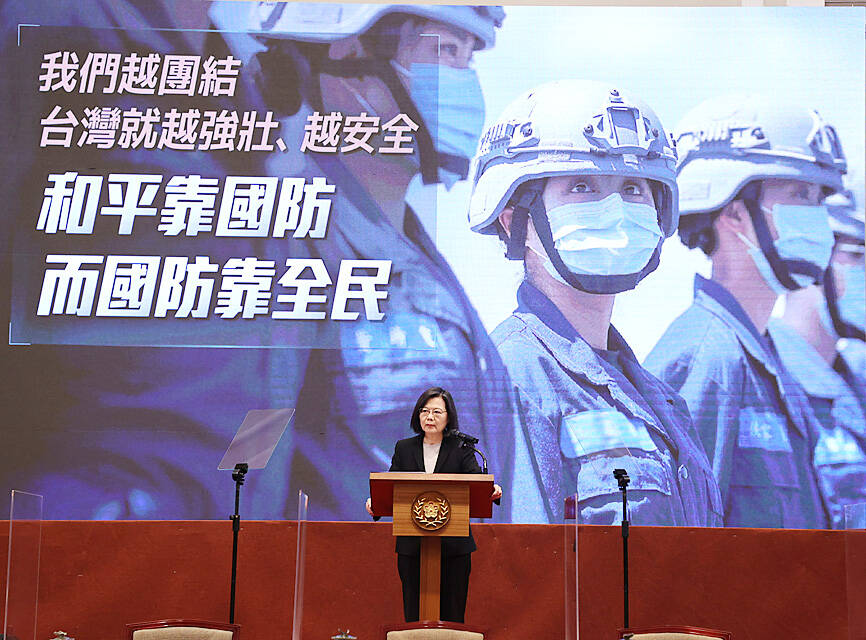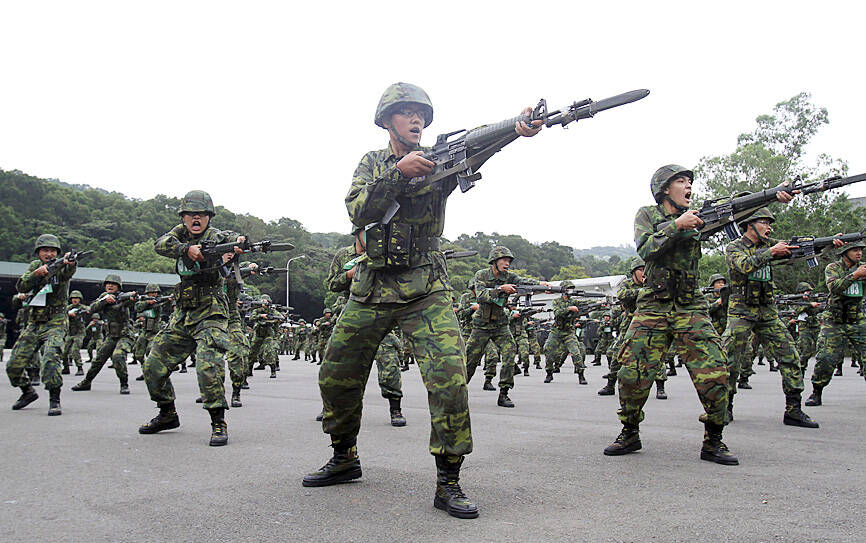Conscription is to be restored to one year for all men born after Jan. 1, 2005, starting in 2024, President Tsai Ing-wen (蔡英文) said yesterday as part of an updated national defense plan.
“The decision is a difficult one, but as the head of the military and for the continued survival of Taiwan, this is an inevitable responsibility,” Tsai said.
As well as returning the mandatory service period to one year, the government is enacting other changes affecting the nation’s military composition, affirming that the volunteer force is to be the nation’s main military arm and establishing a standing defense force mainly comprised of those serving their mandatory service.

Photo: CNA
The government is also looking to bolster its reservist system and would consider implementing a militia system, Tsai said.
The starting salary for conscripts would be increased to NT$26,307 from NT$6,510 to ensure they earn enough to cover their basic daily expenses, she said.
However, the disposable income portion of the salary would be NT$20,320 per month, with the army to provide NT$5,987 to cover meals and insurance, she said.

Photo: Chiang Ying-ying, AP
The announcement was made after Tsai held a round of meetings at the Presidential Office in Taipei with high-level officials to discuss Taiwan’s economic and national security, following months of discussions in the wake of the Russian invasion of Ukraine.
Ukraine is still fighting after more than 300 days, and its resolve to defend itself is an example for everyone who loves and cherishes freedom, Tsai said.
With the Chinese threat looming, Taiwan must prepare for war, and ensure that it can fight to prevent war or end it if one begins, she said.
Many people have stereotypical views of mandatory service based on their own experience, but the training regimen has undergone drastic changes, Tsai added.
To ensure conscripts undergo appropriate training and do not waste time during the longer service period, they would undergo more intense and longer boot camp training to boost their combat preparedness, the president said.
Boot camp training is to be extended to eight weeks from five, and is to include physical fitness and exercise, as well as weapons and combat training.
Standard courses would focus on discipline, equipment maintenance, basic training and stress training, while physical training would include basic fitness, grenade throwing and a 500m obstacle course.
Physical training is to incorporate science-based learning for health management and muscle-building.
The arms training section would increase the number of shots fired from 104 to 160 to ensure that recruits know the differences between weapons and how firing position affects accuracy.
Combat training is to focus on combat techniques, field medicine and what to do in the event of a biological or nuclear disaster, while the training regimen for recruits is to include marches, camp setting and other skills.
The Ministry of Education is in talks with local universities and colleges to develop ways to make the higher-education curriculum more flexible so that conscripts can complete their required one year of service while studying, Tsai said.
That would allow them to avoid postponing plans to enter the job market due to the longer military service requirement, she said.
Since 1949, when the Republic of China government retreated to Taiwan, Taiwanese men have been required to serve two or three years in the military.
After 2000, conscription was gradually reduced to one year by 2008.
Under former president Ma Ying-jeou (馬英九) of the Chinese Nationalist Party (KMT), who was in office from 2008 to 2016, the government turned the nation’s military into a mainly volunteer force, with conscripts, serving in support roles, only required to undergo four months of military training since 2013.
During the four months, conscripts undergo five weeks of boot camp followed by 11 weeks of specialized training with field units.
Additional reporting by Chen Yun

CHAOS: Iranians took to the streets playing celebratory music after reports of Khamenei’s death on Saturday, while mourners also gathered in Tehran yesterday Iranian Supreme Leader Ayatollah Ali Khamenei was killed in a major attack on Iran launched by Israel and the US, throwing the future of the Islamic republic into doubt and raising the risk of regional instability. Iranian state television and the state-run IRNA news agency announced the 86-year-old’s death early yesterday. US President Donald Trump said it gave Iranians their “greatest chance” to “take back” their country. The announcements came after a joint US and Israeli aerial bombardment that targeted Iranian military and governmental sites. Trump said the “heavy and pinpoint bombing” would continue through the week or as long

TRUST: The KMT said it respected the US’ timing and considerations, and hoped it would continue to honor its commitments to helping Taiwan bolster its defenses and deterrence US President Donald Trump is delaying a multibillion-dollar arms sale to Taiwan to ensure his visit to Beijing is successful, a New York Times report said. The weapons sales package has stalled in the US Department of State, the report said, citing US officials it did not identify. The White House has told agencies not to push forward ahead of Trump’s meeting with Chinese President Xi Jinping (習近平), it said. The two last month held a phone call to discuss trade and geopolitical flashpoints ahead of the summit. Xi raised the Taiwan issue and urged the US to handle arms sales to

BIG SPENDERS: Foreign investors bought the most Taiwan equities since 2005, signaling confidence that an AI boom would continue to benefit chipmakers Taiwan Semiconductor Manufacturing Co’s (TSMC, 台積電) market capitalization swelled to US$2 trillion for the first time following a 4.25 percent rally in its American depositary receipts (ADR) overnight, putting the world’s biggest contract chipmaker sixth on the list of the world’s biggest companies by market capitalization, just behind Amazon.com Inc. The site CompaniesMarketcap.com ranked TSMC ahead of Saudi Aramco and Meta Platforms Inc. The Taiwanese company’s ADRs on Tuesday surged to US$385.75 on the New York Stock Exchange, as strong demand for artificial intelligence (AI) applications led to chip supply constraints and boost revenue growth to record-breaking levels. Each TSMC ADR represents

State-run CPC Corp, Taiwan (CPC, 台灣中油) yesterday said that it had confirmed on Saturday night with its liquefied natural gas (LNG) and crude oil suppliers that shipments are proceeding as scheduled and that domestic supplies remain unaffected. The CPC yesterday announced the gasoline and diesel prices will rise by NT$0.2 and NT$0.4 per liter, respectively, starting Monday, citing Middle East tensions and blizzards in the eastern United States. CPC also iterated it has been reducing the proportion of crude oil imports from the Middle East and diversifying its supply sources in the past few years in response to geopolitical risks, expanding